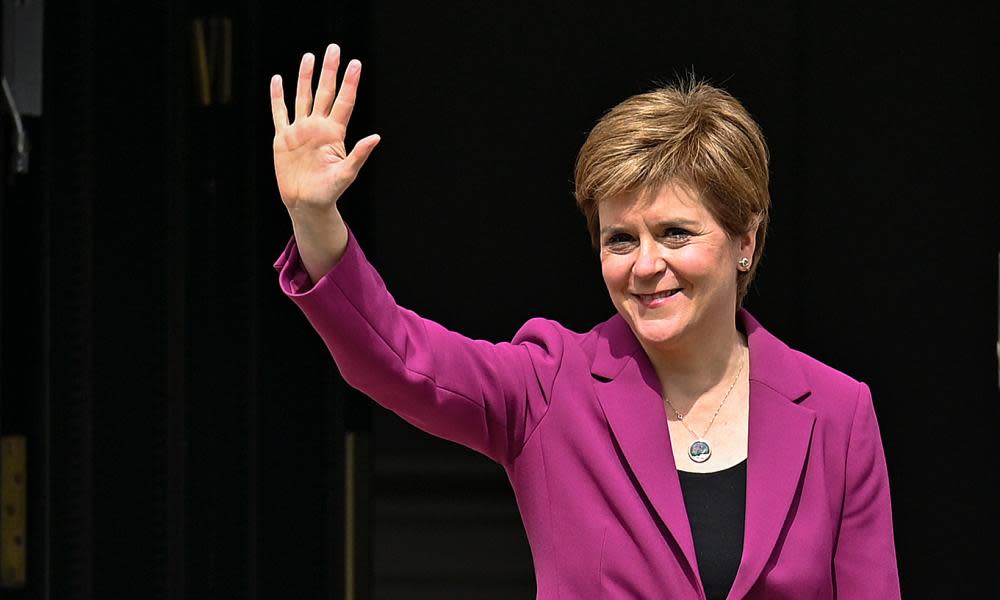Sturgeon says second independence vote ‘a matter of when, not if’

Nicola Sturgeon has told Boris Johnson that a second independence referendum is “a matter of when, not if” after the Scottish National party secured a historic fourth term at Holyrood on Saturday with a pro-independence majority of MSPs returned despite tactical voting by pro-union supporters.
Scotland’s first minister made the assertion in a telephone call with the prime minister on Sunday evening, despite senior Conservative figures questioning her mandate.
Sturgeon has already signalled her readiness for a constitutional battle, saying her government would legislate for the vote “and if Boris Johnson wants to stop that he would have to go to court”.
Earlier in the day, the leader of the Scottish Conservatives, Douglas Ross, accused her of forcing a legal battle over a second referendum to distract from her party’s failure to secure a majority by one seat.
Ross told journalists that “within hours of the polls closing [Sturgeon] had resorted to her usual message of division”.
Asked whether the UK government would take the Scottish government to court if it pushed on with legislation for a second referendum – as Sturgeon has said she plans, after the Covid crisis has passed and preferably by the end of 2023 – Ross said that is was more important to focus on the competency of the Holyrood parliament, suggesting that the matter was unlikely to reach the courts.
“Let’s just look at what the Scottish parliament has the powers to do right now,” Ross said. “I do think Nicola Sturgeon is focusing her argument on a hypothetical court battle about getting something through the Scottish parliament that currently it doesn’t have any competency over, to distract attention from the fact that she has on two occasions failed to secure a majority government.”
Analysts point out that achieving an outright majority is difficult under Scotland’s proportional voting system, although it was done by the SNP in 2011.
But, despite Friday’s challenge to Johnson, Sturgeon suggested on Sunday that she did not expect the row to end up in court. Speaking to the BBC’s Andrew Marr, she said: “It would be absurd and completely outrageous if it ever got to that point.
“If we get to that point then Scotland will be in a situation where it is being told that it has no democratic route to become an independent country … it would be such a grave and serious and undemocratic situation that I don’t believe on either side anybody wants it to get to that point.”
Earlier on Sunday, Michael Gove insisted that speculation about legal action was a “massive distraction” from pandemic recovery.
The Cabinet Office minister told Sky: “I cannot believe that people who are worried about their jobs, the extension of furlough, what’s happening to their children’s education … I cannot believe that the answer to all of these things is a protracted debate on the constitution.”
Challenged on whether it was anti-democratic to disregard a pro-independence majority in the Scottish parliament – made up of SNP and Scottish Green MSPs – Gove countered: “If you look at the votes cast in constituencies in Scotland, more people voted for parties that were opposed to an independence referendum than those that might entertain that prospect.”
He added that “the SNP did not get a majority in this election and also, critically, we had a campaign in which all of the party leaders acknowledge that the single most important thing was dealing with the pandemic”.
Pressed later by Marr on whether the UK government would take the Scottish government to court to prevent it passing legislation for an independence referendum, Gove played down the possibility, saying: “No … but the thing that is critically important is an acknowledgment on the part of all of us as political leaders, whatever parties we come from, that the priority at the moment is not court cases, it’s not independence legislation, it is recovery from the pandemic.”
Sturgeon also confirmed that she would attend the four-nations recovery summit proposed by Johnson on Saturday, in a letter that struck a more conciliatory tone than the previous day when the prime minister called a fresh referendum “irresponsible and reckless”. Gove also told Marr that it was essential to “work together as Team UK”.
Writing for Guardian on Sunday, Gordon Brown appealed to Johnson to represent “middle Scotland”, voters who the former Labour leader says feel more Scottish than British but still wish to see cross-UK collaboration.

 Yahoo Movies
Yahoo Movies 
